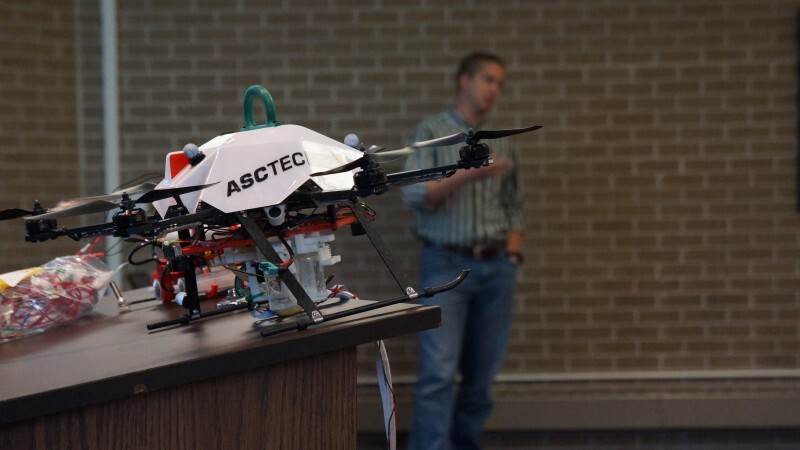
A public forum highlighting diverse research projects focused on improving global water and food security will be hosted by the Robert B. Daugherty Water for Food Institute at the University of Nebraska on May 12 from 8:30 a.m. to 3:30 p.m. in the Arbor Suite at the University of Nebraska–Lincoln’s East Union (1705 Arbor Dr.).
The second annual Water for Food Institute Research Forum is open to faculty, staff, students and the public; however, registration is required.
Students, postdoctoral fellows and their advisers will give short presentations highlighting research projects funded in part by the institute’s Student Support Program, which awards one-year grants to WFI’s interdisciplinary Faculty Fellows to help enrich the education of students who may one day lead the effort to feed the world’s growing population.
The research presented will cover a wide range of topics pertinent to addressing the world’s water and food needs, including evaluating agricultural runoff toxicity, deploying unmanned aerial vehicles to collect water samples, examining the challenges and opportunities in global water policy, developing more efficient use of irrigation water for crop production, optimizing water use in food processing, using time-lapse photography to follow a watershed and more. The forum will also include a luncheon and question and answer period following each presentation.
The full agenda is as follows:
8:30 a.m.
Opening Remarks — Christopher Neale, director of research, Robert B. Daugherty Water for Food Institute
8:40 a.m.
“Biomonitoring Watersheds in Nebraska and Chile: Advancing Toxicity Studies of Agricultural Runoff Both Near and Far” — Jonathan Ali, graduate research assistant, environmental, agricultural and occupational health, University of Nebraska Medical Center; Alan Kolok, graduate research adviser, director, University of Nebraska at Omaha Nebraska Watershed Network, and professor UNMC Department of Environmental, Agricultural and Occupational Health
9 a.m.
“Leveraging WFI Resources to Address Water for Agriculture in Latin America Under a Changing Climate” — Rachindra Mawalegedara, postdoctoral fellow, earth and atmospheric sciences, UNL
9:20 a.m.
“Studying the Drought Impact in California Using Satellite-based Soil Moisture Data” — Vijendra K. Boken, professor, geography and earth science University of Nebraska at Kearney
9:40 a.m.
“Climate Change Feedbacks Via Insurance” — Eric Holley, graduate research assistant, natural resources, UNL; Adam Liska, graduate research adviser, associate professor, biological systems engineering, and agronomy and horticulture
10 a.m.
“Enhancing Drought Tolerant Root Responses in Wheat” — Harkamal Walia, associate professor, agronomy and horticulture, UNL
10:20 a.m.
Break
10:40 a.m.
“Improving Soil Moisture Monitoring in Agricultural Systems Using Hydrogeophysics” — William Avery, graduate research assistant, natural resources, UNL; Trenton Franz, graduate research adviser and assistant professor, natural resources, UNL
11 a.m.
“Developing a Framework to Benchmark Efficiency in the Use of Irrigation Water for Crop Production” — Kate Boone, graduate research assistant, agronomy and horticulture, UNL; Patricio Grassini, graduate research adviser and assistant professor, agronomy and horticulture, UNL
11:20 a.m.
“From Paper to Big Data: Interoperability of the Nexus Water-Food-Energy Data” — Francisco Munoz-Arriola, assistant professor of biological systems engineering and natural resources, UNL
11:40 a.m.
“Determination of Field Sensor Density for Real-Time Crop Management” — Babak Jafarisamani, graduate research assistant, computer science, UNL; Haishun Yang, graduate adviser and associate professor of agronomy and horticulture, UNL
12 p.m.
Luncheon
12:40 p.m.
“Unmanned Environmental Monitoring and Sample Collection” — James Higgins, graduate research assistant, computer science and engineering, UNL; Carrick Detweiler, graduate research adviser and associate professor, computer science and engineering, UNL
1 p.m.
“Taking Soil to the Cloud: Advanced Wireless Underground Sensor Networks for Real-time Precision Agriculture” — Abdul Salam, graduate research assistant, computer science, UNL;m Mehmet Can Vuran, graduate research adviser and associate professor, computer science and engineering, UNL
1:20 p.m.
“Implementing Machine Learning Techniques to Improve Predictability of Groundwater in a Changing Climate” — Alessandro Amaranto, graduate research assistant, biological systems engineering, UNL; graduate research advisers Francisco Munoz-Arriola, UNL, and Dimitri Solomatine, UNESCO-IHE
1:40 p.m.
“Influence of Climate Change on Trace Organic Loading Rates to Groundwater” — Renys Barrios, graduate research assistant, civil engineering, UNL; graduate research advisers Shannon Bartelt-Hunt, associate professor and graduate chair, civil engineering, UNL; and Xu Li, associate professor, civil engineering, UNL
2 p.m.
Break
2:10 p.m.
“Water Optimization in Food Processing Operations” — Yulie Meneses Gonzalez, graduate research assistant, food science and technology, UNL; Rolando Flores, graduate research adviser, and professor and department head, food science and technology, UNL
2:30 p.m.
“Moving Beyond Borders: Transnational Actors, Networks and Water Security” — Maria Benes, graduate research assistant, political science, UNL; Patrice McMahon, graduate research adviser and associate professor, political science, UNL
2:50 p.m.
“Determination of River Ecological Discharge from Navier-Stokes-Forchheimer Equation” — Narendra Patel, graduate research assistant, civil engineering, UNL; Junke Guo, graduate research adviser and associate professor, civil engineering, UNL
3:10 p.m.
“Platte Basin Time-lapse Project” — Carlee Koehler, undergraduate research assistant, agricultural leadership, education and communications, UNL; undergraduate advisers, Mike Farrell and Michael Forsberg, assistant professors of practice, agricultural leadership, education and communication, UNL
3:30 p.m.
Discussion and closing remarks







